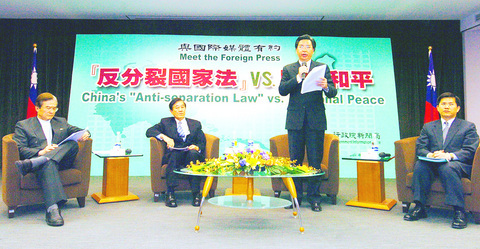China's proposed anti-secession law will establish a special court for handling cases of "separatist activity," while officials on both sides of the Taiwan Strait would be held to account if they do not act appropriately in opposing Taiwanese independence, Mainland Affairs Council Chairman Joseph Wu (吳釗燮) said yesterday.
Wu said he had not seen a draft of the law, but sources which he refused to name had passed on to him the "fundamental principles that [China] have to follow in enacting the law."

PHOTO: SEAN CHAO, TAIPEI TIMES
Wu said the bill would prohibit "secessionist activity" and stipulate punishment for offenders.
"[It will] define the status of Taiwan as ... a holy and inseparable part of the People's Republic of China," he said.
Wu said that offenders would be tried in a special court, and that Chinese government officials whose performance in curbing Taiwanese independence was found to be unsatisfactory, either by commission or omission, would also be legally responsible.
"[If] Taiwan's administration or military sectors do something that leads to war between the two sides, they will be charged with this kind of crime as well," he said.
Wu said the proposed law would give China license to define what constituted separatist activity and whether it was a crime.
"This will have serious implications and it's going to rock ... cross-strait relations," Wu said.
"I think in order to make sure what this crime is about they have to define what Taiwan independence is and ... the current definition of Taiwanese independence is quite broad," he said.
"Anything other than unification is going to be defined as independence and therefore anybody who speaks out in support of the Taiwan government might be charged with this kind of crime," he said.
"[Taipei] Mayor Ma Ying-jeou (
Ma, who was born in Hong Kong, was recently refused a visa there, apparently in retaliation for recent criticism of the proposed law.
Wu, who was joined by Minister of Foreign Affairs Mark Chen (陳唐山) and Vice Minister of National Defense Tsai Ming-hsien (蔡明憲), again called for international intervention.
They said that the international response to the bill so far had been inadequate.
Chen pointed to the words of concentration-camp survivor and Nobel Peace Prize winner Elie Wiesel, telling the foreign press yesterday that the Holocaust had occurred because "people chose neutrality."
"Ignorance and choosing to be neutral -- these are the two biggest problems," Chen said.
He said that the bill was clearly not a domestic matter because China had already discussed the matter with the US face-to-face.
When asked what the government hoped to see the international community do in response to China's actions, Wu said that, aside from popular censure, he hoped that governments would use whatever connections they had to get the message through to China.
Tsai's approach was more direct.
"I humbly ask the news media to reflect on what our people are thinking here," he told reporters.
"This is an urgent call to the international community to stop China before it is too late," Wu said.

AIR SUPPORT: The Ministry of National Defense thanked the US for the delivery, adding that it was an indicator of the White House’s commitment to the Taiwan Relations Act Deputy Minister of National Defense Po Horng-huei (柏鴻輝) and Representative to the US Alexander Yui on Friday attended a delivery ceremony for the first of Taiwan’s long-awaited 66 F-16C/D Block 70 jets at a Lockheed Martin Corp factory in Greenville, South Carolina. “We are so proud to be the global home of the F-16 and to support Taiwan’s air defense capabilities,” US Representative William Timmons wrote on X, alongside a photograph of Taiwanese and US officials at the event. The F-16C/D Block 70 jets Taiwan ordered have the same capabilities as aircraft that had been upgraded to F-16Vs. The batch of Lockheed Martin

US President Donald Trump yesterday announced sweeping "reciprocal tariffs" on US trading partners, including a 32 percent tax on goods from Taiwan that is set to take effect on Wednesday. At a Rose Garden event, Trump declared a 10 percent baseline tax on imports from all countries, with the White House saying it would take effect on Saturday. Countries with larger trade surpluses with the US would face higher duties beginning on Wednesday, including Taiwan (32 percent), China (34 percent), Japan (24 percent), South Korea (25 percent), Vietnam (46 percent) and Thailand (36 percent). Canada and Mexico, the two largest US trading

GRIDLOCK: The National Fire Agency’s Special Search and Rescue team is on standby to travel to the countries to help out with the rescue effort A powerful earthquake rocked Myanmar and neighboring Thailand yesterday, killing at least three people in Bangkok and burying dozens when a high-rise building under construction collapsed. Footage shared on social media from Myanmar’s second-largest city showed widespread destruction, raising fears that many were trapped under the rubble or killed. The magnitude 7.7 earthquake, with an epicenter near Mandalay in Myanmar, struck at midday and was followed by a strong magnitude 6.4 aftershock. The extent of death, injury and destruction — especially in Myanmar, which is embroiled in a civil war and where information is tightly controlled at the best of times —

China's military today said it began joint army, navy and rocket force exercises around Taiwan to "serve as a stern warning and powerful deterrent against Taiwanese independence," calling President William Lai (賴清德) a "parasite." The exercises come after Lai called Beijing a "foreign hostile force" last month. More than 10 Chinese military ships approached close to Taiwan's 24 nautical mile (44.4km) contiguous zone this morning and Taiwan sent its own warships to respond, two senior Taiwanese officials said. Taiwan has not yet detected any live fire by the Chinese military so far, one of the officials said. The drills took place after US Secretary